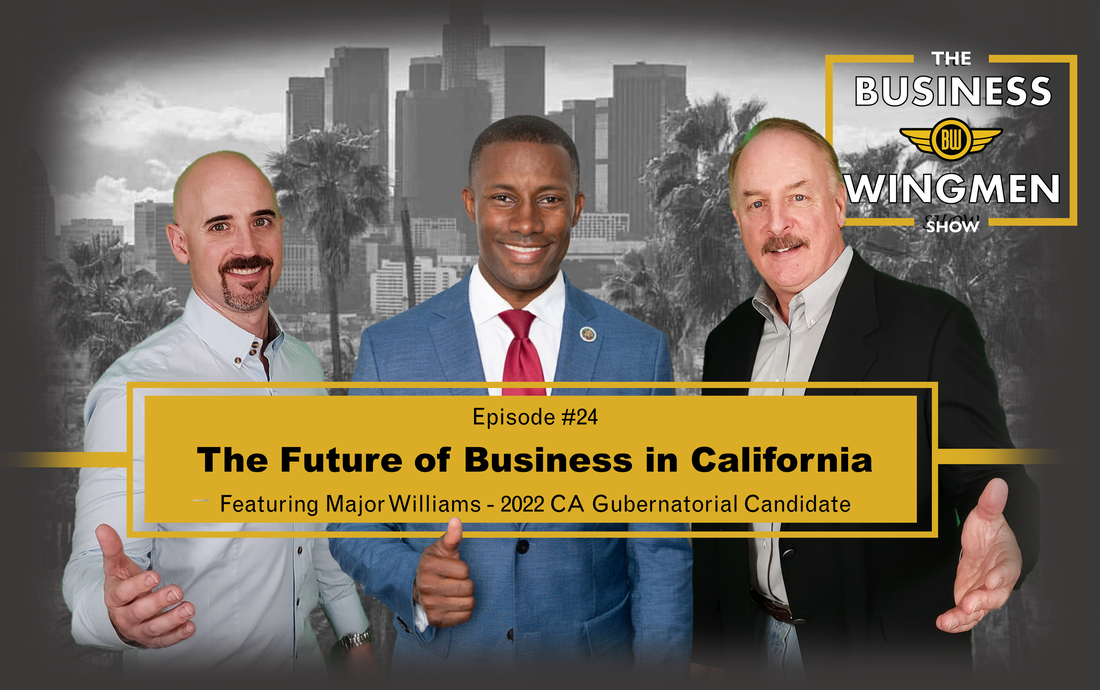|
Medtech Snapshot presents Rodney Brenneman, medtech start-up exec, who shares his winning strategy on what is needed from a leadership perspective in order to propel a pre-clinical company forward.
Hear how emotional intelligence, adaptability and long-term strategies make the difference! If you're enjoying these Medtech Snapshots, be sure to check out our archives of past episodes HERE. #medtech #snapshot #podcast #medicaldevice #startup #entrepreneur #strategy #commercialization #emotionalintelligence #EQ #leadership
0 Comments
Medtech Snapshot: Medical Device Funding - join us as CEO Bill Colone takes us through strategic considerations for obtaining funding in early stage start-ups.
For more information on how Square-1 can help your startup, check us out HERE. #medicaldevice #medtech #snapshot #funding #investment #entrepreneur #startup #founder #privateequity #venturecapital Not all places of business are one in the same, nor is our ability to succeed in said environments. This, of course, is an obvious statement but for reasons verging on inconspicuous. In business, working for the establishment (the Bigs, Conglomerates, Strategics, etc) versus being in the start-up arena is a constant back and forth consideration for many of us in the medical device industry. This becomes especially true if we find ourselves looking elsewhere for work at which point the phrase “the grass is greener on the other side” has a devilish way of distorting our worldview. Fun Fact: the phrase ‘”the grass is greener on the other side” traces back to the Greek poet Ovid, circa first century B.C.; Ovid is credited with saying, “The harvest is always richer in another man’s field.” From there the American folk singers Raymond B. Egan and Richard A. Whiting wrote a song called “The Grass Is Always Greener in the Other Fellow’s Yard” in 1924. And there you have it. Why is this important? Simply put – we are not original in our thoughts about our present circumstances and opportunities close to us. ‘The grass is always greener’ is really a tale of fantasy, one which often supposes things are naturally better elsewhere just because it doesn’t define our present reality. Herein lies an important question as it relates to you and the medical device industry – what company size are you best suited for and does this environment present greener pastures? Is your current job the right 'grass'? THE BIGS Working for big business certainly has its perks, there’s no doubt about it. Stability, direction, benefits, work that is defined – you name it. The medical device industry naturally follows this familiar path while also provide other such commonly held benefits like:
This list represents typical benefits which may come with working at a big company, but certainly aren’t guaranteed by any means. As we all know, just because it’s a big company doesn’t denote excellence by any means, which is perhaps the very reason the start-up world exists. START-UPS The start-up world can be an exciting place. I’ve experienced this personally for over a decade in my own business as well as supporting dozens of medical device clients who have new and burgeoning places of business. In the start-up environment its common to hear people describe their experiences as:
The world of medical device start-ups can be an alluring place for work. Is it possible the start-up world is where ‘the grass is greener’? The answer to this question comes down to one thing – how you’re conditioned to operate as a professional. If you are currently looking for a new career it’s vital you truly understand what makes up the medical device start-up world and whether or not you can be successful in that environment BEFORE you jump in to start work. Take a moment to check in with yourself on how you land with these characteristics which commonly can be found in the start-up world: 1.Stability Start-ups can be exciting places to work because many times the companies and their respective technology are seeking to disrupt the market by bringing new approaches to tired practices. This excitement comes with a twist – funding. The life of a medical device start-up lends itself to a constant and almost never ending process of fund raising to help the company achieve its next milestones. Some start-ups excel in their ability to raise funds, many struggle mightily. Reportedly more than 75% of device start-ups fail, 50% of which fail in the first five years. As a start-up grows and evolves it’s not uncommon for them to also go through waves where they are flush with cash in one season, to find themselves on the brink of going under the next season. Understanding if you are comfortable in an environment which can be viewed as ‘feast or famine’ is crucial to your ability to be successful in the start-up world. 2.Working Outside the Box When we work for big companies often times our job and daily output is focused on a certain set of tasks, we’re siloed into a niche function. It’s the opposite in the start-up world as often times the mentality of those who are successful in this space is they’re willing to do whatever it takes to get the job done and company moving forward. This includes taking out your own trash! If you’ve ever said “that’s not part of my job description” in response to work that was requested of you I would recommend taking a hard look at whether a start-up or small company is the right move for your career. Job descriptions are incredibly loose in the start-up world, if they even exist in the first place. 3.Time Requirements Working 8-5 in a large company can be a nice perk. If you’ve done that for any length of time you may have forgotten how nice it is to mentally shut off at 5PM. With medical device start-ups working 8-5 is non-existent. It’s common to work long hours and or be tethered to your phone around the clock. The statement of ‘work life balance’ is blurred beyond recognition in the start-up world. Those that are successful here know and understand that it takes time and effort to create something. How dedicated are you to making that happen and what are you willing to giving up in the process? 4.Ambiguous Nature Working in a large company doesn’t necessarily mean that everything is clearly defined and outlined yet it is typical that SOPs (standard operating processes) are at the very least available for workers who choose to use them. Different departments exist handling tasks specific to their function in the larger machine. In the start-up world you may find yourself creating these on your own. Take a moment to think how you would feel about being confronted with a daily situation where you are supposed to be working hard, hell – harder than ever before, and there isn’t a lot of direction or support to help you in that effort. If the thought of that excites you than the start-up world may be a breath of fresh air. 5.Leadership This is one of the most overlooked aspects of a start-up in my opinion. Leadership. If you haven’t worked in the start-up world before you may not be aware that people in leadership still do much of the hands on work. In big business this is hardly the case. Neither camp of leaders are necessarily better than one of the other, it’s just a very different environment. In start-ups every person on the team has to give 150% to the cause which means those who don a leadership title still have to get dirty in the day to day work. The reason you want to consider this as a part of your ‘can I make it in the start-up world’ is because leadership ultimately can have a great or very grave impact on the start-up business. Seems a bit obvious but when someone is doing both daily work and in charge of strategic decision making their influence and involvement has a much greater impact. In big business if a company experiences a failure with one of their leaders it typically can be salvaged whereas in the start-up world one or two costly mistakes by leadership will send the company into a grave six feet under. 6.Collaboration Start-ups offer an intimate working experience. It’s a necessity. Working in a start-up everyone knows everything about everyone. It’s close quarters with high amounts of communication, partnering and feedback. Collaboration of course exists in big business but not at the intimate level of the start-up. When we work for a big company we are often a part of a team but doing work independently, even at times on our own little island. If you’ve come to enjoy your island and aren’t interested in having neighbors all over your lawn on a daily basis than perhaps staying in big business is the right decision for you. FINAL WORD
A career in the medical device start-up arena can indeed be a rewarding and exciting adventure – for the right person. Once you’ve spent some time analyzing what’s most important to you in your career and the type of company which is most suitable to help you achieve success you will better understand how the medical device start-up world fits in with your next steps. The Future of Business in California3/30/2021 TODAY AT 4 PM pacific!
Business owners of all industries and sizes have had to battle many challenges over the last year; pandemic, economic, societal, technological and political, just to name a few. All of these challenges have served up their own unique obstacles to deal with. The hosts of Business Wingmen Podcast Show Steve and Travis host a special guest, Major Williams, who will talk about today's business climate and his vision for the future of business in California. Join us to meet Major Williams - a seasoned entrepreneur, business owner and now candidate of Governor of California! Listen in on the discussion at www.businesswingmen.com #podcast #business #california #majorwilliams #economy #future #leadership #businesswingmen Executive Summary: The world of startups and small business can indeed be an exciting place to be. Its commonly characterized as highly collaborative, fast pace, less bureaucratic and wildly innovative. While this sounds great in theory, in practice the world of a startup can be rife with challenge, including heavy amounts of stress and uncertainty. It’s vital we as professionals analyze our personalities and professional behaviors to assess whether or not we would do well in the startup world - before we actually jump in. Knowing what you’re up against before you dive in will allow you to determine if it’s appropriate for you to consider the startup space, small business and or entrepreneurship. Author: Travis Smith Read the full article by downloading the below PDF attachment
As a child I dreamt of being a business owner. While the other kids in the neighborhood were talking about being pro athletes I always imaged myself starting a business. At the spry age of 10 I opened my first business in the early 90's in my parents basement in rural New York selling used skateboard parts. It was exciting! I had a business sign which proclaimed ‘Sk8 Parts’, a rack to display my shoddy products for sale and even a chair to sit on while waiting for the sales to come rolling in. After a summer being in business I had only made one sale a set of dirty and worn out skateboard wheels for a measly fifty cents to a kid down the street. That sale bought me a pink panther ice cream from the neighborhood ice man. While the business didn’t rocket me to instant success like I had envisioned I was hooked on the idea of being a business owner in the future so I could buy the whole ice cream factory, not just one pink panther. As I got older I tried my hand at inventing all sorts of things, products that I thought would get me rich, if I could only figure out a way to sell a few million of them. First it was a gaming chair, then workout towels and even a handheld flashlight projector. My entrepreneurial dreams ended at the time with a website I tried to start in 2006 that would allow people to ask questions and get advice based off real life business situations they were dealing with. That was a $2k boondoggle which went nowhere.
It wasn’t until the summer of 2015 that I would find my way, diving head first into entrepreneurship by starting Square-1 Engineering. Thankfully I had a lot of help from many close people around me (wife, parents, friends) who all were incredibly supportive. Four years into my current entrepreneurial journey I’ve learned and experienced firsthand many things which have helped me navigate my way to present day. Of all these experiences, learning lessons and awareness gained there are eight which have brought about the biggest positive impact in helping me weather the entrepreneur start up storm: 1.Get A Mentor This is the single second best decision you’ll ever make in business. The first best decision is to become an entrepreneur. Mentors have experience which you can learn from helping you avoid mistakes along the way. 2.Support Gets You Over The Hump Make sure those close to you understand your vision and support it. They don’t have to buy in 100% but if it’s you against the world there are going to be some very long nights in store. If you are married it’s vital your spouse understands the opportunity and supports it, even in the down times. 3.Some Things CAN Wait Some people will tell you it’s important to write a business plan, vision, mission, blah blah blah, right away. Unless you’re in a situation where you need to ask for capital to start the business the best thing to do is put those things aside and focus all your efforts on how to make money. Ultimately being an entrepreneur means you’re selling something to someone so the more time you spend on how you’re going to get paid for the product or service you’re providing the better off you’ll be. 4.You Can’t Be Everything to Everyone I failed miserably here. When I did start to get customers I tried to offer them everything under the sun in order to get their business. Some times it worked, often times it created a nightmare for me as now I had to deliver the goods. Never over promise, you’ll most likely end up under delivering. Find one or two areas you can become an expert in, one or two problems you can solve for your customers. Do that and only that before you start getting into other areas of opportunity. 5.Having a Plan-B is Dangerous I’ve read countless articles about “the power of having a ‘plan-B’ ” or an alternative course of direction. I hate that advice. As an entrepreneur if you don’t believe in what you’re doing and have a plan-B set up in case you fail you’re almost destined to set yourself up for disappointment. I’m not saying it’s not important to plan ahead for bumps in the road but if you’re going to start a business that should be your one and only focus. Anything other than a mentality of success has no place for you. Visualize to materialize. 6.Outsource Work The first several months I attempted to handle all the accounting and finance portions of the business only to realize two things: 1 – I’m not good at it nor do I like it; 2 – I created more problems than I remedied. Best advice I got was to pay the money to get a reliable CPA that understood my business and could help scale it up by making good decisions. Best money I’ve ever spent was a CPA. 7.The Power Of Saying ‘No’ Crucial to your success as an entrepreneur is the ability to politely and professionally say ‘no’. Similar to ‘you can’t be everything to everyone’ saying ‘no’ is harder than it sounds. Naturally you want to say yes to everyone, making everyone around you happy, especially if it’s a customer. Unfortunately, when we do this we get pulled in a hundred directions which causes us to deviate from our destined course. If you are asked to do something and it doesn’t align with your top 2 or 3 priorities politely decline and thank the person for the opportunity to be considered, even if it is a customer. 8.Breathe, It’ll Be Okay Very few things in life actually have the ability to stop you from moving forward in your new business. When bumps in the road momentarily derail you (you will experience plenty of bumps along the way) take a deep breath and be thankful for the opportunity to learn and grow as a professional. Stephen Covey put it best when he gave us the 90/10 principle: “10% of life is made up of what happens to you, 90% of life is decided by how you react.” – Stephen Covey Working for big business certainly has its perks, there’s no doubt about it. Stability, direction, benefits, work that is defined – you name it. For some, this is the ideal work environment. We plot along through our 8-5 and enjoy the consistent pace that comes with it.
For a growing number of professionals while the world of big business has its strengths, it also serves to hold us back in our careers which is why we turn to the start-up world. How do I know this? I’ve lived it myself. After more than 10 years of working for a $6B company I left and went into the start-up world. My story, while it may not be unique, is a growing story many others now share. Why do people like the idea of start-ups? First and foremost, it can be an exciting place to work. Decisions are often made speedily, there’s typically much less bureaucracy, work is more flexible and of course it tends to be much more creative. We also have the ability to learn much more about our jobs and the impact it has on the overall company and or business. Therefore, it is possible to say being in the start up world allows us to become better business people in the process as we get to see the big picture, not just our individual roles and workloads like what happens in big business. Then it’s settled, everyone should work in a start-up! I mean, who wouldn’t want to work in that kind of an environment? Hold up compadres, pump the brakes a moment. The start-up world is no picnic. Yes, the start-up world is exciting and full of daily innovation and discovery but it can also be rife with challenge, uncertainty and stress. Not everyone is built or meant to be in the world of start-ups. We may think we are however the reality is some of us are just better off being in big business. Before you jump ship from your large company into the world of a start-up (and or small business) take a moment to check in with yourself on how you land with these five characteristics which are vital to ones success in the start-up environment: 1.Working Outside the Box When we work for big companies often times our job and daily output is focused on a certain set of tasks. It’s the opposite in the start-up world as often times the mentality of those who are successful in this space is that they’re willing to do whatever it takes to get the job done and company moving forward. This includes taking out your own trash! If you’ve ever said “that’s not part of my job description” in response to work that was requested of you I would recommend taking a hard look at whether a start-up or small company is the right move for your career. You don’t have an option to be picky in a start-up, the only option is to do it. Even if that means taking out your own trash. 2.Time Requirements Working 8-5 in a large company can be a great perk. If you’ve done that for any length of time you may have forgotten how nice it is to mentally shut off at 5PM. In start-ups working 8-5 is non-existent. It’s common to work long hours and or be tethered to your smart phone around the clock. The statement ‘work life balance’ is blurred beyond recognition in the start-up world. Those that are successful here know and understand that it takes time and effort to create something. How dedicated are you to making that happen and what are you willing to give up in the process? 3.Ambiguous Nature Working in a large company doesn’t necessarily mean that everything is clearly defined and outlined yet it is typical that SOPs (standard operating processes) are at the very least available for workers who choose to use them. In the start-up world you may find yourself creating these on your own. Take a moment to think how you would feel about being confronted with a daily situation where you are supposed to be working hard, hell – harder than ever before, and there isn’t a lot of direction or support to help you in that effort. If the thought of that excites you than the start-up world may be a breath of fresh air, if not then maybe your 3 foot wide cubicle and plush ergonomic chair your large company bought is the safer bet. 4.Leadership This is one of the most overlooked aspects of a start-up in my opinion. Leadership. If you haven’t worked in the start-up world before you may not be aware that people in leadership still do much of the hands on work. In big business this is hardly the case. Neither camp of leaders are necessarily better than one of the other, it’s just a very different environment. In start-ups every person on the team has to give 150% to the cause which means those who don a leadership title still have to get dirty in the day to day work. The reason you want to consider this as a part of your ‘can I make it in the start-up world’ is because leadership ultimately can have a great or very grave impact on the start-up business. Seems a bit obvious but when someone is doing both daily work and in charge of strategic decision making their influence and involvement has a much greater impact. In big business if a company experiences a failure with one of their leaders it typically can be salvaged whereas in the start-up world one or two costly mistakes by leadership will send the company into a grave six feet under. 5.Collaboration Start-ups offer an intimate working experience. Working in a start-up everyone knows everything about everyone. It’s close quarters with high amounts of communication, partnering and feedback. Collaboration of course exists in big business but not at the intimate level of the start-up. When we work for a big company we are often a part of a team but doing work independently, even times on our own little island. If you’ve come to enjoy your island and aren’t interested in having neighbors up in your grill on the daily than perhaps staying in big business is the right decision for you. A professional life in a start-up can indeed be a rewarding and exciting adventure. Once we’ve spent some time analyzing what’s most important to us in our career and what we’re willing to do to get it than we’ll have a better idea of how the start-up environment and career fits in with our plans. Monday Quickie - Get Out of Your Own Way6/17/2019 Marshall Goldsmith, celebrated author and leadership coach, is famously quoted as saying, “What got you here won’t get you there”. Over the course of my career I’ve been amazed how many times this quote has shown up in my career or the people around me, ringing all too true.
What go you here won’t get you there. It means the work, style, approach and effort you did to get you to a certain point won’t allow you to continue succeeding and hitting the next level, promotion or milestone. I see this happen often in two areas of business: promotions and entrepreneurs. When we’re striving for a promotion the effort it takes to prepare oneself to get promoted often means we’re upgrading ourselves, our output, overall performance, professionalism, etc. We’re bringing more to the table in order to achieve something – a promotion. We do the job to get the job. However once the promotion occurs, it’s uncanny how often times the approach and effort we used to get the promotion isn’t what is needed to be successful in the new role. Take for example getting promoted from an individual contributor role into your first management role. You’re a staff level (individual contributor) engineer who excels in product development and as a result you start getting noticed by upper management. You’re consistently hitting your deadlines, solutions oriented, taking on additional initiatives, finding work proactively, helping your peers, etc. These are some of the characteristics of a high performing staff level engineers. These very characteristics are what get people noticed for management consideration. Fast forward, the stars have aligned, and you’ve accepted the promotion. You’re in management now for the first time in your career. You’re a bit nervous because you’ve never been in management before but you’re confident you’ll succeed in this role just like you did in the last role. You’ll do the same thing as before, working hard, and everything will work out. Sound familiar? This is the genesis of the statement by Goldsmith “What got you here won’t get you there”. Now that you’re in management you’ll need to deploy a new set of skills in order to be successful. Some of these skills you already possess like the ability to hard work, focus on being the best you can be, attention to deadlines, leading by example, etc. However, now you also need to employ a new set of skills to make this new role work. Skills like listening, influencing, strategizing resources, planning, holding people accountable, communicating above and beyond to ensure your message and intent is understood by your team. The key difference is the skills necessary to be successful in management are different and require more than what was necessary in the individual contributor role. You’re now responsible for people and the product, not just the product itself. If you were to use the same approach and tactics you did to get promoted into management now that you’re in management you run the risk of struggling. Struggle leads to frustration and for some of us discontent. The snowball effect inevitably for some leads to daydreaming being back in an individual contributor role and out of management. The same can be said for entrepreneurs. The second area I see this happen is when entrepreneurs get in their own way of being successful. A talented person filled with passion, enthusiasm and spirit to do something different comes up with an idea and begins to put it into action. Our entrepreneur, largely due to their work ethic and unyielding mindset to succeed can find themselves in situations where their idea, product and or company suddenly beings to grow. At times, grow rapidly. They’ve done an amazing job taking an idea and turning into a viable reality. Outsiders begin to see the hard work and effort of this entrepreneur and want to join the party. A team is formed. Just like that, POOF, a company is born. In the world of medical devices this plays out as someone having a great idea to improve a patient experience or technology. They build their idea into a tangle product, secure funding and start growing the company around it. It’s a thrilling time for the entrepreneur(s) as their dreams begin to become reality. Up to this point much of the success of the product and new company can be attributed to the founding entrepreneur(s) and their early teams. Once again, we find ourselves at a crossroads where Goldsmith’s statement ‘What got you here won’t get you there’ comes into play. As the company grows so do the expectations and requirements to hit each successive milestone. Products need to be rigorously vetted, tested and refined to meet each new milestone. External forces, like the FDA or investors eventually get involved, adding further angst and expectation to the company and the product development process. Many entrepreneurs find the process up to this point rewarding and exciting, yet the most challenging parts lie ahead. The two most common goals for an entrepreneur and their start-up company in the medical device space is to either position their company for acquisition by a larger suiter, or build it up as a stand alone organization, commercializing the product for sale. Both of these outcomes require a similar thing to happen – the company must shift and meet new expectations, new milestones and operate as a sophisticated organization. It’s no longer the wild west free flowing organization it once was at the beginning. Rules are in place, processes, procedures and increasing expectations. Our entrepreneur, who can be credited with the early successes of the company, now needs to make a decision. Does s/he continue to lead the charge or bring in another person who is more experienced in leading companies to the next stage of life. This is an incredibly tough decision, one many entrepreneurs struggle with. Why? Two reasons: ego and the passion they had which got them here in the first place. It’s incredibly tough to step aside from your baby (the company the entrepreneur founded) to hand off the reigns to someone else. Most people can’t do it and so they continue to lead the organization thinking they can get it to the next level. In fact, some people can indeed do this, however many struggle unnecessarily. Staying at the helm leading the company for many entrepreneurs is a catastrophic decision. Many entrepreneurs by their nature can be classified as A-types, controlling, visionaries, big picture thinkers, passionate types. While these are great characteristics to have, they don’t always make for the right recipe to take an organization to the next stage – mature growth. As such, the entrepreneur chooses to stay in the driver seat continuing to lead the company with varying degrees of success. Inevitably problems start arising within the company. The key indicator our original founder/ entrepreneur is having a hard time in the leadership ranks is their organization is flush with people problems. Attrition is high, employees are discouraged, little effort is put into going above and beyond, leaderships approach is more dictating rather than encouraging and influencing. As a result of these challenges problems start arising with the product. Issues plague the organization from all angles. Many of us are better off being the founder, the visionary, not the CEO or chief leader growing a company through maturity. How do we overcome Marshall Goldsmith’s statement “What got you here won’t get you there”? We invest early in ourselves by getting a mentor! Mentors do many things but above all they provide perspective. Mentors see the writing on the wall long before we do. Since they aren’t in the weeds and often times have an external perspective it allows them room to see all the angles. Having a good mentor in place in crucial to anyone, regardless of their professional, but especially important for someone seeking a promotion or operating as an entrepreneur. How do we deal with Goldsmith’s statement – we change or we get out of the way. Mentors can help you change, help you elevate yourself, help you grow and flourish. The trick is you have to be open to the feedback. Open to change, bringing along a growth mindset. People who operate in this capacity, open to feedback with a growth mindset, stand a much better chance making the right decisions in these key moment (promotions, entrepreneurship) rather than allowing their ego’s to write checks their bodies can’t cash. Are you living Goldsmith’s statement today, “What got you here won’t get you there”? If so, get yourself a mentor and be prepared to face your reality. You’ll either need to adjust accordingly or get out of the way. Key Take-Away: The effort and approach you used to get to one milestone inevitably won’t be what’s needed to help you get to the next milestone. Are you an entrepreneur? If so, get a mentor and begin building your growth mindset so you can be prepared to appropriately grow your baby (your company). Action Item: Get a mentor. It doesn’t matter what level of your career you’re at or what your role is. Spend the time now to invest in yourself for the future, even if your working future is only a couple years away from retirement. Invest now to be a better person tomorrow. Check out www.micromentor.org, it’s a free service put on by a nonprofit organization which matches people with mentors. The number one reason people opt out of entrepreneurship, which includes starting a business, being a solopreneur or even independent consultant, is fear. The wild west of entrepreneurship can come with a lot of unknowns as ambiguity and uncertainly is often synonymous with starting a business. It can be especially distressing for first time would-be-entrepreneurs to make the leap into small business as a result. The transitionary period from corporate life to entrepreneur, even the thought of this transitionary period, is marked with great concern and fear which keeps people from making the jump. For some it may be security at the current job, others it may be a lack of know-how in starting a business or simply a lack of self confidence in ones’ ability to make it on their own. Regardless of the reason, fear is a factor all potential and current entrepreneurs must overcome. I’ve found the best way to overcome fear is to confront it head on. Fear grips us all, regardless of occupation, experience, background or capabilities. The difference between the people who let fear own them versus those who use it as a tool to achieve comes down to two things: acknowledgement and action. Rather than worry, it’s important we address our fears and understand them. When we take the time to acknowledge our feelings and emotions it allows us to better process why we’re feeling this way, at which point we can begin to build a strategy for using those fears as a motivating force towards success. Taking action against our fears comes in the form of slowing down, identifying your feelings, understanding the situation and then planning accordingly. If time is on your side rest easy knowing that you can plan to be an entrepreneur first before you ever jump in the ring. Create an attack plan, identify potential challenges and solutions on how to deal with them. While you won’t be able to plan for everything taking a proactive approach to dealing with fear and using it as a tool perhaps may be enough for you to finally make the leap into the world of entrepreneurship. Key Take Away: Address your entrepreneurial fears head on, understand them and own it! Action Item: Use your newly addressed fears as a guiding force to plan your entrepreneurial transition into being your own business owner. Build alliances, or peer groups, with other business owners to help with the transition while learning from their experiences along the way. Interested in learning more about entrepreneurship and hearing stories from people who have made the leap into business ownership? Check out this event in Irvine, CA on 10/24/18: https://www.devicealliance.org/event/entrepreneur-event/ In honor of Fathers’ Day yesterday I’m sharing a personal story which I’m incredibly proud of, as well as continuously inspired by.
Often I hear people say that by your late 40’s to early 50’s a professional has hit their zenith, their peak, pinnacle, apex, summit - if you will, in their career. Late 40’s? How can that be? At that age you’re only half way to retirement. What’s to become of the next 20 years? I like to think that statistics like ‘hitting your peak in your late 40s’ is nothing other than just a data point. We only make it relevant if we live up to it. Imagine this - at the age of 51, could you completely reinventing yourself professionally? Not because you have to but because you want too. I know someone who did just this and it happens to be my father, Steve Smith. After a tenured and very successful career in consumer products, “condoms to caskets” our family used to say, my father hit a pivotal point in his career. He had just exited a senior leadership position with a large multi-billion dollar company in 2008 and found himself in a predicament. He was looking for his next career step at the age of 51 and at the same time the economy was starting to come crashing down. Needless to say it was a tough time back then. The uncertainty in this country was thicker than pea soup. We didn’t know which way was up or if the recent paycheck we received would be our last. As companies were closing down left and right someone I know took a bold stand and decided to open up a company. Looking back at this point in my life I didn’t appreciate or quite frankly understand that moment in my fathers’ life. How he felt, the challenge of reinventing oneself, the stress of having a family to care for, etc. I just knew he was tough as nails, he’s always been a superhero in my eyes, and would figure it out. Worried, I was not. And figure it out he did. In the middle of the largest economic downturn of our lives my father chose to become an entrepreneur starting a business in executive and small business coaching. He vowed never to return to corporate America to work for another man/woman as this time he was working towards his own dreams under his own rules. At the ripe and spry age of 51 he became an entrepreneur. He hustled; he got out and met with people 3-4 times a day. He shook hands and kissed babies, maybe not so much on the baby side but I’m telling you he worked hard. He outworked even me, someone at the time half his age. His determination and mindset was flawless, at least it was from the outside. What’s just as impressive is that our family, mainly my sister and I, never saw him sweat. He was starting a business from scratch, something he had not done before and was doing it with the poise of a statesman. It didn’t come easy but sure enough my fathers’ business eventually started to grow. He leveraged relationships, made new ones, offered a niche service and delivered impeccable results. He kept his word and delivered the goods. Nothing in life comes easy or quick for that matter and my fathers’ story is no different. Fast forward, both my sister and I are entrepreneurs who have started our own businesses from scratch following in our fathers’ footsteps. I must give my father credit because he showed our family that you can be successful and start a business from scratch, it just takes time, effort and the mindset to see it through. As a result I was encouraged to follow my own dream, just like my father did. I’ve learned a lot from my father and the experience he went through some 10 years ago. I’ve learned that age is just a number. Your mindset is what will carry you through. I’ve also learned the importance of having a support system to help you along the way. That credit goes entirely to my mother who stuck by him and continues to do so today. Lastly, I learned that taking risks in life is important. If we constantly live saying ‘what if’ we run the chance of missing out on a lot of rewarding experiences. If we are going to make a bold step in life the best way to go about that is by giving all of ourselves to it. That’s a choice, one we can exercise freely. Today my father, Steve Smith, runs a successful executive and small business coaching company. I see firsthand what he does for his clients and am continually amazed at what he’s doing to inspire, impact and develop other people not just professionally but also personally. As if that wasn’t enough he’s having fun doing it as he lives the American dream. Honored. Humbled. Appreciated. Dad. About the AuthorTravis Smith is the founder and managing director of Square-1 Engineering, a medical device consulting firm, providing end to end engineering and compliance services. He successfully served the life sciences marketplace in SoCal for over 15 years and has been recognized as a ‘40 Under 40’ honoree by the Greater Irvine Chamber of Commerce as a top leader in Orange County, CA. Categories
All
Archives
July 2024
|
||||||
Visit Square-1's
|
|














 RSS Feed
RSS Feed


